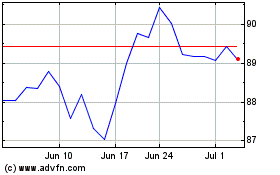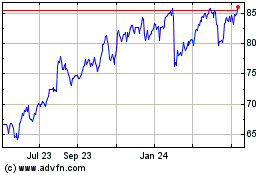Aflac Incurs Loss on Shedding Debt - Analyst Blog
June 24 2011 - 11:59AM
Zacks
Yesterday, Aflac Inc. (AFL) filed a statement
disclosing impairment and investment losses of about $610 million
to be incurred in the second quarter of 2011.
These losses are associated with the company’s exposure to risky
investments in the financial institutions of Portugal, Ireland,
Greece and Spain (PIGS). The company expects to retreat from all of
its risky investments in Europe by the end of this year.
The PIGS nations have been undergoing severe financial crisis
since 2008 and are yet to recover from it completely. Hence, Aflac,
who holds over $6.3 billion in long-term debt in these nations, has
been quite eager to offload all risky investments there.
However, the company’s de-risking actions come at a time when
the European governments are insisting the banks and insurance
companies to actively take part in bailing out the PIGS nations
from the surmounting debts. While it could be looked at through
various perspectives, we believe that Aflac is keener to save its
financial position before saving the nations.
Accordingly, Aflac will incur $165 million owing to a pre-tax
loss on the divestment of its investments in Greece and Ireland
banks and other financial institutions. Previously, the company had
disclosed only $72 million of loss from these investments. With
respect to the investments in banks of Portugal, Aflac estimates
pre-tax impairment losses of about $445 million.
As of March 2011, Aflac had about $4.37 billion of exposure to
risky investments in Portugal, Greece and Spain. This excludes the
sale of its investments worth $77 million in the Allied Irish
Banks.
During the first quarter of 2011, Aflac booked losses from
investments, derivatives and hedging activities in PIIGS nations
worth $376 million or 79 cents per share. Such impairment losses
have been nibbling into the company’s earnings, which has a record
of posting double-digit earnings growth.
Moreover, in order to get rid of the sour investments in Europe,
Aflac has now turned to Japan, and is seeking permission to issue
debt securities worth about ¥100 billion. This is an attempt to
de-risk its portfolio and shift investments to a less risky zone.
However, according to a news flow, Japan is buying European bailout
bonds, which indicates that Aflac could be into a debt
trap.
Besides, while Aflac is indulging in de-risking activities, it
is moving towards investments with lesser risk and lower yields,
which will further lessen investment income. Moreover, the
company’s substantial exposure to European financial institutions
hybrid securities, below-investment-grade debt and perpetual
securities is likely to result in statutory investment losses and
lower reinvestment yields, thereby escalating the financial and
capital risk.
Increased losses in the investment portfolio and lower income
from the variable annuity business is expected to continue to hurt
the earnings at least in the near term, until the markets witness
steady recovery. This is also reflected in management’s estimation
of generating earnings at the lower-end of the guidance of 8–12% in
2011.
Overall, we believe that although increased catastrophe losses,
exchange rate fluctuations and investment losses from European
sovereign debt continue to be a concern over the next couple of
quarters, Aflac has a strong earnings potential beyond 2011, which
will help mitigate risks related to the constitutional capital and
also enhance the company’s statutory earnings. Therefore, we
recommend Aflac at Neutral, waiting for the smog to clear out.
AFLAC INC (AFL): Free Stock Analysis Report
Zacks Investment Research
AFLAC (NYSE:AFL)
Historical Stock Chart
From May 2024 to Jun 2024

AFLAC (NYSE:AFL)
Historical Stock Chart
From Jun 2023 to Jun 2024
